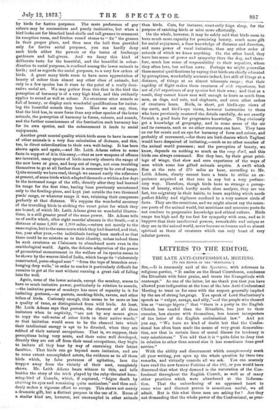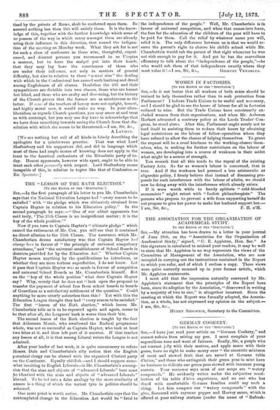LETTERS TO THE EDITOR.
THE LATE ANTI-CONFESSIONAL MEETING.
[TO TRH EDITOR OF TRH " SPECTATOR:']
SIR,—It is commonly said of the Spectator, with reference to religious parties, "It smiles on the Broad Churchmen, condemns the Ritualists with faint praise, and treats the Evangelicals with contempt." As one of the latter, let me thank you that you have allowed your indignation at the tone of the late Anti-Confessional Meeting to treat us for once with the respect generally implied by the use of strong language. You speak of Lord Shaftesbury's speech as "vulgar, savage, and silly,"—of the people who cheered him as "savage bigots ;" that "there is a party in the English Church less candid than the Ritualists, less just to their enemies, less sincere with themselves, less honest interpreters of the letter of the English ecclesiastical law." And yet you say, "We have no kind of doubt but that the Confes- sional has often been made the means of very great demoralisa- tion, nor that in certain lines of moral disease its tendency is very mischievous." You add that it is "quite false to deny that in relation to other than sexual sins it has sometimes done good service."
With the ability and discernment which conspicuously mark all your writing, you open up the whole question by these two remarks, and virtually concede all we ask. You can scarcely have read the now famous Petition of the 483, or you would have discerned that what they demand is the restoration of the Con- fessional throughout the English Church, as well as of many other practices which were abandoned at the Reforma- tion. That the unburdening of an oppressed heart to some wise and discreet person is aometimes useful, we all admit. But is this what these men are asking for ? Are they not demanding that the whole power of the Confessional, as prac-
tised by the priests of Rome, shall be conferred upon them. Be assured nothing less than this will satisfy them. It is the know- ledge of this, together with the further knowledge which some of us possess of the way in which many amongst them are already using their influence in this direction, that roused the indigna- tion of the meeting on Monday week. What they ask for is not for such a class of confessors as those wise, thoughtful, experi- enced, and discreet persons you recommend in so Utopian a manner, but to have the scalpel put into their hands, that they may lay bare the consciences of those who are under their influence, not only in matters of general difficulty, but also in relation to those "sexull sins" the dealing with which in the Confessional has caused such loathing and dread among Englishmen of all classes. Doubtless the 483 and their sympathisers are divisible into two classes, those who are honest but blind, and those who are crafty and discerning, but the history of the Church proves that the former are as mischievous as the latter. If some of the teachers of heresy were not upright, honest, and highly moral men, it would make no way. In your ultra- liberalism as regards Church questions, you may sneer at and treat us with contempt, but you may one day have to acknowledge that we have done something towards saving the Church from that dis- solution with which she seems to be threatened.—I am, Sir, &c.,
A LAYMAN.
[We see nothing but evil of all kinds in falsely describing the apologists for a mischievous practice. That was what Lord Shaftesbury and his supporters did, and did in language which most of them had ample means of knowing does not apply in the least to the fanatical enthusiasts of the Ritualistic party of to- day. Honest opponents, however wide apart, ought to be able to treat each other personally with respect. Lord Shaftesbury seems incapable of this, in relation to topics like that of Confession.— ED. Spectator.]



































 Previous page
Previous page